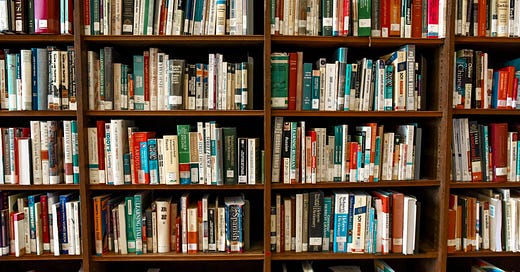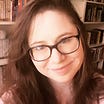My Dream Job Wasn’t What I Hoped It Would Be—So I Found a New Dream
I had to be there to arrive here
Growing up, I was the nerdy kid who loved school, reading, and visiting her public library at least once a week. I didn’t have many friends, and the ones I thought I had either bullied me or were fair-weather friends who left me for the new kid. The friends I could rely on the most were books, and the characters in them I admired.
I got through high school and undergrad without much fanfare and, having accepted that I probably wouldn’t make a living as a film reviewer and historian, pondered a steady career. While I pondered, I went to art school for a post-baccalaureate certificate in art history and studio practice and had a lot of fun flexing my creative muscles. Later that year, when I was accepted into a Masters of Library Studies program at one of the most prestigious universities on the east coast, I thought, “Of course. This is it. This is the path for me.” I was going to be a pillar of organization, work with old materials, and help people find the books and information they needed, all while wearing adorable tortoiseshell glasses and cardigans.
I threw myself into the program with so much enthusiasm. I was part of a graduating class of around fifteen, and I loved how intimate the lectures were. I was certain we would weather together any growing pains we felt, and would take solace in knowing we weren’t alone. I loved the campus and study spaces, and it was far enough away from home that I could do a lot of reading on the bus and have a good separation of work and life. At twenty-five, I finally had some direction, and I felt so grown up and sure of myself.
I was less than a week in when I realized something was very, very wrong. I wasn’t intimidated by the workload, as I was used to that from undergrad. And it wasn’t the professors, who were very knowledgeable in their respective fields and fully supported us students. It was the tech. Technology had never been my strong suit, and here it seemed to be the focus of every class—and it was more complex (to me) than I could have imagined it would be. I was shocked to discover that my dream job of being a librarian, an occupation I’d coveted since I was about six years old, was a romanticized version of a role that hadn’t existed in a long time. The hopelessness I felt about this program would hang over me like a dark cloud for the next eight months.
Concepts that the others in my program caught on to so easily I just couldn’t figure out—and when I thought I had them figured out, a low grade on a quiz would prove I didn’t. I’d never floundered so hard at school before, and it frightened me how vulnerable I was to failing, particularly when the stakes were so high, with student loans I’d have to pay back regardless of how well I did.
I buckled down and tried harder. I made sure to complete all of the class readings, even the supplemental ones. I met with my professors to talk about where I was struggling. I got tutored for the first time in my life, and I waited for things to get easier. I waited for the relief of dawning comprehension. It didn’t come. And it only got worse. When I realized I was leaving class to cry in the bathroom from the overwhelm every single week, I knew it wasn’t normal.
The tipping point came when I went on a school trip to Toronto to visit different libraries—academic, public, journalism, government—and to learn about the various kinds of work they do at each institution. I was particularly excited to see my favorite library in the country for the first time. It was the TIFF Film Reference Library, and I’d have happily moved and left everything behind to work there. The head librarian was even kind enough to meet me for tea, and I gushed about how much I wanted to work with the archival materials and to be a librarian in such an important medium as film. She listened patiently, with a smile, and told me (and I have to emphasize very nicely) that due to a small staff and very little turnover, I would be waiting for a shot to work in that library for an indefinitely long time. The blow of this news was crushing.
Back at school, I made an embarrassing mistake that caused me to fail my Research Methods course, and I now had to decide between taking the course again—which would result in a late graduation—or walking away from the program.
I spoke with two academic advisors, both of whom said to me, “You’ve already invested a year.” Their meanings were polar opposites. One was implying, you’re practically halfway there, you might as well keep going; the other meant, you’re clearly miserable—do you want to do another year of this and spend even more money to do it?
I was at a fork in the road and quite stuck. Thankfully, being enrolled in that program came with one solid benefit: a very kind career counselor. With her I did the real soul-searching work I’d never done up to that point. I completed the Myers–Briggs and various other tests, and one of the careers suggested was editing. I’d found something new to try. Would it prove as much of a pipe dream as librarianship had been? I was apprehensive. But it made sense in a lot of ways, given how much I love to read and write. I found a distance learning program that offered a two-year certificate, and my husband and I were about to move into a pretty cheap apartment that left a little financial wiggle room. What was I waiting for?
Leaving the library program was hard. There are a lot of personal projects I don’t finish, but with something as important (and expensive) as this, it was hard not to believe myself a failure. But that feeling went away with time. Where of course! had been the exclamation of epiphany I’d used for being a librarian, editorship was more of a quiet there you are, as though it had been hiding from me until it was ready.
I have never found so much satisfaction in my work life as when I began working in publishing. With this vocation, I feel as though I truly help writers by guiding them through the process that might result in their moving someone with their words—you can’t beat that. The first time I edited something professionally, I felt like I was flying an airship: a bit nervous, heavily reliant on my training and resources, and (blissfully) untethered.
I still wear tortoiseshell glasses and cardigans—in the comfort of my home office and library in a small apartment in a city I love. Eight years after leaving library studies, I’m building up my freelance business, and I’m very happy with the life I’ve made with my partner and small dog. My biggest takeaway from this curveball is learning that it’s never too late to start over. I’ve met so many editors who had a whole other life and career before they found editing. And that’s okay. I have no regrets over either the time or money I’ve invested on this journey. I had to be there to arrive here, and I learned so much about myself along the way that I can be nothing but grateful.






"my dream job of being a librarian, an occupation I’d coveted since I was about six years old, was a romanticized version of a role that hadn’t existed in a long time."
I've heard this from many friends who have worked in libraries, and yes, I also had that dream as a kid ❤️